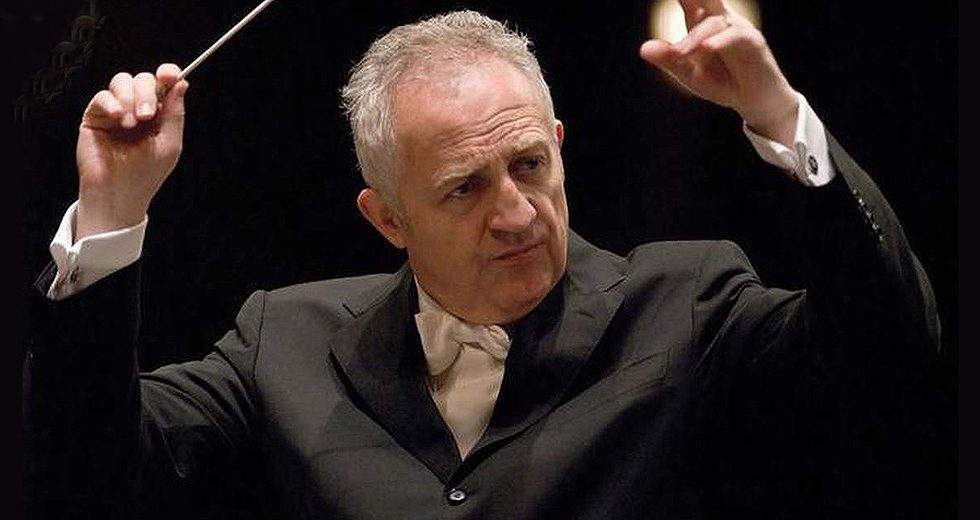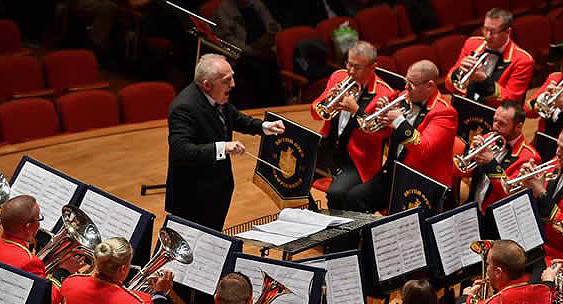
English maestro Bramwell Tovey is the very model of versatility. After all, it’s hard to imagine anyone else capable of leading the New York Philharmonic and Foden’s, one of England’s leading brass bands, in the same season. The composer-conductor has unusually catholic musical tastes, which include not just the expected Brahms and Beethoven but also jazz (in this genre, he has recorded two albums as a pianist), opera and operetta, and yes, brass bands. It so happens that he got his start playing in Salvation Army groups as a boy in the 1950s and ’60s; he regularly returns to those roots, guest conducting Foden’s since 2000 and serving as artistic director of the National Youth Brass Band of Great Britain since 2006.
Though Tovey has led the Chicago Symphony Orchestra twice at the Ravinia Festival, he will make his belated subscription debut on Feb. 3-4, after the CSO returns from a two-week, 11-concert tour of Europe. “It’s an incredible orchestra,” said Tovey, music director of the Vancouver (B.C.) Symphony Orchestra. “I’ve really enjoyed my visits to Ravinia, but those are very brief one-night stands. You really only get a taste of what it is. And I’ve never even been inside Orchestra Hall. So I feel like a real neophyte.” (On March 24-25, he also will lead the CSO in an all-Gershwin program, featuring Tovey as piano soloist in Rhapsody in Blue.)

Bramwell Tovey leads Foden’s Band, one of the world’s leading brass ensembles, founded in 1900 in northwest England.
To highlight the conductor’s British heritage, the CSO artistic staff asked if he would be interested in leading the orchestra’s debut performances of William Walton’s Orb and Sceptre, which was written for the coronation of Queen Elizabeth II in 1953. Tovey readily agreed. “It’s a fantastic concert march,” he said. “It’s really brilliantly written.” Because there is no soloist for these concerts, Tovey suggested Benjamin Britten’s The Young Person’s Guide to the Orchestra, which shows off every section, as a second offering. “It’s an amazing piece of writing,” he said. “It can be appreciated on an almost child-like level but it’s also tremendously sophisticated. The characteristics of each instrument are brilliantly realized by Britten.”
Then what for the second half? He and the CSO settled on the idea of presenting the orchestra’s first-ever concert performances of the complete Act 2 from Tchaikovsky’s celebrated ballet, The Sleeping Beauty. For Tovey, it is a return to a musical realm he knows well. At just 22, he was appointed staff conductor of the London Festival Ballet. After serving as music director of the Scottish Ballet, he held the position of principal conductor of Sadler’s Wells Royal Ballet, one of the world’s most distinguished companies, in 1984-88. He recalls a two-week period when he did nothing but conduct back-to-back, three-hour performances of The Sleeping Beauty, so the work is clearly deeply ingrained in him.
The problem of bringing ballet to the concert stage is that the suites assembled from the works are “extremely dissatisfying,” he said. So he had the idea of performing the entire second act, something he has done a few times to what he described as a “terrific reception” from audiences. “From the opening of the horn fanfare through to the end of the act is some of the most incredible music that [Tchaikovsky] ever wrote,” Tovey said. “There is an entr’acte for violin solo, which is often used as a separate concert piece, and there is a cello solo that is redolent of the Fifth Symphony — very similar melodic material but with a quite a different outcome. Then, a build-up of drama to the end of the act where on stage the sleeping beauty is awakened by a kiss from the prince. The music itself, when you see it in the theater, is incredibly exciting but it doesn’t even appear in the suites.”
Now 63, Tovey has served as music director of the Vancouver Symphony Orchestra since 2000. While on a cross-country trip across Canada in the 1980s with a touring arm of the Royal Ballet, he guest-conducted the country’s major orchestras and made some enduring connections. From 1989 through 2001, he served as music director of the Winnipeg Symphony Orchestra and played a key role in establishing the city’s now-acclaimed new music festival in 1992. In 1997, the Vancouver Symphony — one of Canada’s three main orchestras, along with those in Toronto and Montreal — tapped him for its music-director vacancy. “I said, yes, and that’s pretty much how it came about. They were in the middle of a search process, and I was wondering what to do next.” During the negotiations, his agent called Tovey with what he thought might be a stumbling block. The orchestra wanted Tovey to make his principal residence in Vancouver. He chuckled as he recounted the story, noting that Vancouver happens to be one of the world’s most beautiful cities: “I said, ‘I think I can manage that.’ So that’s why I’m here.”
The Vancouver Symphony is the largest arts organization in western Canada, presenting more than 150 concerts a year. It performs in the city’s Orpheum Theatre, a 1927 movie palace that was refurbished in 2009. The historic building has one of the “friendliest and most beautiful orchestral acoustics in the world,” he said. In 2011, the VSO School of Music, a 25,000-square-foot community music school, opened next to the Orpheum. It serves about 1,700 students, with Tovey acting as artistic adviser. “Vancouver is just a very organic, earthy and environmentally friendly place, — and I think the orchestra plays a huge role in the city’s life,” he said.
As music director, he has led the complete symphonic cyles of Beethoven, Brahms and Mahler and overseen the Canadian premieres of many international works. In addition, the orchestra presents new music via its Annex series and an annual festival. “I’m just very proud of the fact that our orchestra has operated at a very high level in a deficit-free environment for 16 years of my tenure so far,” he said. “It’s been a real testament to the city and the orchestra musicians particularly that in this time, supposedly, of difficulties for symphony orchstras, we’ve actually not had that here.”
In 2013, Tovey announced that he would step down as music director after the 2017-18 season. “The average tenure these days of a music director is about seven to nine years, so this will be pretty much double that by then,” he said. “It’s been a very good run. I really love the relationship with the orchestra and the musicians here, and I’ll miss all that tremendously, but I will have been a music director at that point for 30-plus years. If you do it properly, it’s a huge job.”
Besides leading rehearsals and concerts, he takes part in musician auditions and many other orchestra activities, including fund-raising, marketing and public relations. “I’m looking forward to putting those things down for a year or two and just concentrating on being a musician,” he said. “I’m actually looking forward to looking after me, as it were, for a bit — just recharging the batteries.”
Among other things, he would like to devote more time to practicing the piano. In addition to conducting the New York Philharmonic and other orchestras from the keyboard, he has accompanied many singers and instrumentalists and recorded two jazz albums, including “Love Walked In,” a compilation of Gershwin songs with soprano Tracy Dahl. He also would like to spend more time composing, something he only does now in snatches — early in the morning or during occasional breaks between meetings or rehearsals. “It’s just part of my personal makeup — being a composer as well,” he said. “It’s just part of what I do and part of what I want to do, and I just try and make the time as best I can.”
Tovey’s most performed work is Requiem for a Charred Skull, which won the 2003 JUNO Award (Canada’s equivalent of the Grammy) for best classical composition. But perhaps best known internationally is Urban Runway (2008), a piece that was co-commissioned by the New York Philharmonic and Los Angeles Philharmonic and received its British premiere in December by the BBC Concert Orchestra. Naxos is set to release a recording of The Inventor, which was commissioned by the Calgary Opera, in early 2017.
Another of Tovey’s many skills is as an orator. While some conductors feel awkward or uncomfortable speaking from the podium, he seems to revel in it. Indeed, his wit and way with words is one of the reasons he has been such a hit at summer concerts, where such commentary is typically more welcome. When he made his subscription debut with the New York Philharmonic in 2002, he was asked to speak briefly about Anton Webern’s Symphony, Op. 21, a rarely heard piece. His success with those remarks played a key role two years later in his being named conductor and host of the N.Y. Phil’s annual Summertime Classics festival at Lincoln Center.
Elsewhere, Tovey said he is sometimes encouraged to offer some words from the podium. “Usually if I’m in any doubt about whether to speak or not, I don’t. I just make that a rule,” he said. The question to answer, he said, is: “Can it enhance the proceedings or will it get in the way?” Often with new music, giving the audience a “hanger” on which it can place its “listening coat” can be helpful. But any commentary, he said, has to be “understandable, jargon-free and relatable to the average audience member’s experience.” He tries to follow the rule of thumb of only talking about three things, because no one will remember any more than that. He vows never to mention “tone rows, retrogrades and recapitulations.”
Speaking from the podium is a little like hosting friends for dinner. “If you’re boring, you’ll turn them off,” he said. “If you’re welcoming and tell them things that can enhance the experience while being a human being about it — it’s important not to be as dry as dust — then you can help people listen.”
Kyle MacMillan, former classical music critic of the Denver Post, is a Chicago-based arts journalist.